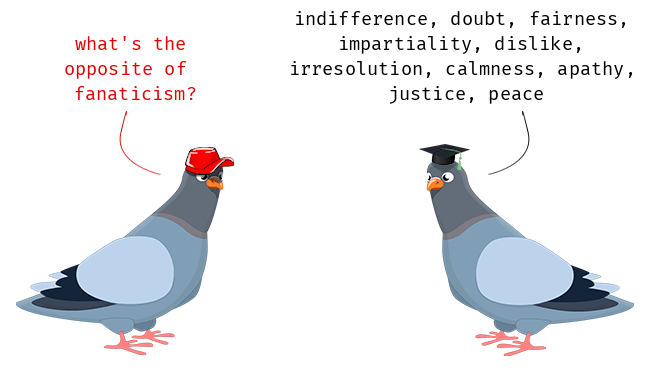Fanatisism is...?
Religious fanaticism is a higher-level spiritual blindness, one (of many) kinds of madness. Fanaticism begins with being enthralled by an idea or belief that has no rational basis or scientific, religious or ideological justification. All fanatics (distinguished only by the subject matter with which they are “preoccupied”) have done so for the same reason: the inability to distinguish the essential from the trivial, the real from the unreal, the symbolic and the metaphorical from the factual. Religious fanaticism is the inevitable outcome of indoctrination and insufficient critical reflection on what is believed.
How can be manifestations of Fanaticism Classified?
The manifestations of fanaticism can be classified into two basic groups:
1) fanaticism as an expression of a damaged mind and logic;
2) fanaticism in an altered state of consciousness (obsession, idolatry or speaking in incomprehensible languages, uncontrollable outbursts of emotions, hysteria…).
What are the Dangers of Fanaticism?
It would be very difficult to group fanaticism by the degree of potential danger to the environment. Both because of the different and difficult to predict chain effects and because of the different effects on different profiles of people. What is certain is that increasing the number of fanatics multiplies the dangers of each species. If there is a sufficient number or critical mass of ideological and / or religious fanatics in a particular area, they will without doubt try to force their concept on others.
A religious fanatic ignores common sense and logic, known truths, laws and facts, and builds his views from unreasonable and unsustainable claims. The fanatic proclaims what is symbolic or metaphor in the Bible literal, and distorts factual texts. When natural insight becomes impaired, it becomes more and more useless over time. So in cases of religious fanaticism and extremism the difference between the spirit of truth and righteousness and the spirit of delusion and bigotry is canceled. It is a disease of spiritual ability when people imagine seeing things or having knowledge that is not realistic or that does not exist. They are poisoned by spiritual and mental illusion, much like a human being poisoned on the body by intoxicants or unhealthy foods. The fanatic has inspiration, but not from God, and is therefore willing to defend his illusions at all costs.

How do Fanatics Portray the Bible?
The fanatic also has a constant tendency to portray the Bible as a set of fanatic ideas. A sectarian and a fanatic cannot be helped to reassure themselves with reasonable views and facts, because reason has already been sacrificed at the altar of fanaticism.
People often resort to tolerance in different beliefs or levels of understanding of faith, and this is correct. Any normal person who has a false belief because they are indoctrinated or misinformed will be easily corrected when they find out the truth. However, this is not the case with fanatics.
Fanatics are characterized by an unbalanced state of mind. The tendency to fanaticism is reflected in the tendency to walk “on the edge”, on the border of reality and imagination, the desire to capture something wonderful and new. The fanatic neglects and despises the wise and prudent movement, and avoids arousing emotional and extreme views, as advised and instructed by the Word of God.
In order to cover up their realities and to conceal the most absurd misconceptions, fanatics invoke a literal interpretation and understanding of the Bible. This is followed by incredible persistence in trying to prove something that is patently incorrect. The fanatic is quick to deny the inspiration and guidance of God, or at the very least to declare him unreliable where the things presented do not suit him. The fanatic catches on to some of the minor details he uses as “evidence” while completely ignoring the clearly stated facts. So, for example, there is a sect that advocates the so-called. a lunar shabbat that is supposedly calculated according to the lunar calendar instead of the simple weekly cycle that was given during the Creation and confirmed in the Decalogue. Another negative example is the flat-earth fanatics. Usually, they are persons who do not have the elementary general and scientific knowledge of geography and astronomy, but they will with great zeal defend their views that are, to put it mildly, at the level of idiocy. They will also spice up his “proof” with the thesis of a general conspiracy and misconception about the actual shape of the Earth and the structure of the universe.
Why is Fanaticism Dangerous?
There is a tendency in human nature to go from one extreme to the opposite. Many act fanatically. Some people are consumed by the zeal they mistakenly believe, but character alone is the true proof that someone is truly on God’s side. Experience has shown that Satan seeks to push those souls that cannot be chilled with cold indifference into some form of fanaticism.
Why is fanaticism dangerous and why it has no place in God’s work? Sects and fanatics are a scandal for normal-minded people because they can be permanently repelled by any contact with religion. The fanatic shames the work of God and ridicules it in such a way that he disdains all religious people. Only one fanatical statement is enough to cast doubt on the bearers of the work of God and doubt the correctness of the biblical religion. Fanaticism is gradually undermining and perverting biblical teaching, giving meaning to biblical texts that have no function or have perverted function. In persons who persistently cling to their fanaticism (despite such clear evidence that the act is a force of darkness or in sharp contrast to common sense and logic) we cannot trust. No importance should be attached to their judgement.
As a rule, the spirit of bigotry is very persistent and stubborn. In most cases, no evidence can convince a fanatic that he is mistaken. Therefore, encounters and contacts with fanatics are very uncomfortable, both to those in the work of God and to an average reasonable person who does not have to be religious. This unpleasantness is created through an attempt to attack common sense, while, on the other hand, a smart and honest person is ashamed of himself instead of a fanatic or an unreasonable man. As the proverb says, “what a smart man is ashamed of, a fool is usually proud of.” Fanaticism lowers the massive gate of aversion to the concept behind it.
“The way of fools seems right to them, but the wise listen to advice.” (Proverbs 12:15)
Whoever isolates himself seeks his own desire; he breaks out against all sound judgment. A fool takes no pleasure in understanding but only in expressing his opinion. (Proverbs 18: 1,2)
“For wisdom will enter your heart, and knowledge will be pleasant to your soul. Discretion will protect you, and understanding will guard you. Wisdom will save you from the ways of wicked men,from men whose words are perverse,.” (Proverbs 2: 10-12)

